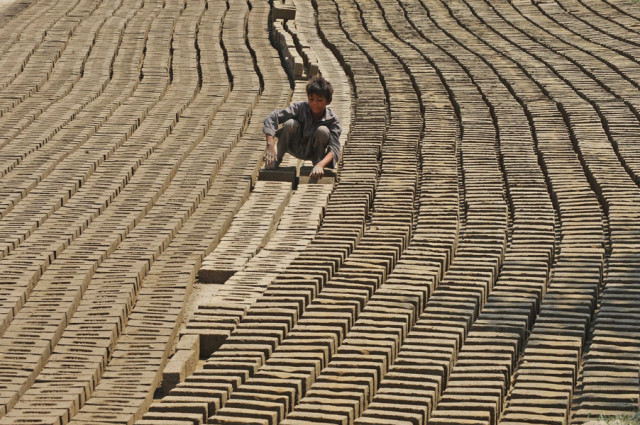Granting rights: First brick kiln workers group to receive social security cards
16 labourers of three kilns were given cards at a ceremony by SPARC on Friday.

The bricks industry was recognised by the government in the 1980s but the rights of the labourers working at the kilns are still pending. PHOTO: FILE
A ray of hope has risen for thousands of brick kiln workers who have until now been denied labour status and the associated social security benefits. The very first group of kiln workers in Sindh, although a trickle, received their social security cards on Friday at a ceremony organised by the Society for Protection of Rights of Children (Sparc).
The cards, given to 16 labourers of three brick kilns on the occasion, offer a range of advantages. These include death grant of Rs150,000 to Rs500,000, marriage grant of Rs100,000 to Rs200,000, burial grant, financial and medical support for pregnant and injured workers and pension of up to 75 per cent of the wages to the handicapped. The cards will allow the workers’ children to get educated at the Sindh Employees Social Security Institution (Sessi) model schools and widowed women will receive up to 130 days of wages.

“For decades, the kiln workers neither had labour status nor job security,” said Sparc’s Zahid Thebo. “This move, if implemented completely, will provide them both.” He indicated that their struggle, which they started around five years ago, has only entered a new phase.
The Sparc, he added, is also filing a petition in the Supreme Court to seek waiver of mandatory contribution from the employer of six per cent of a labour’s wage for registration with the Sessi. He cited the SC’s July 2013 verdict in which the former chief justice Iftikhar Muhammad Chaudhry ordered the Punjab government to register kiln workers. “Through the petition, we will also demand a fixed minimum wage for the workers, fixed working hours and an employment letter,” Thebo said.
The labour department’s deputy director, Ghulam Sarwar Uttero, informed that they have registered around 1,000 kilns in the province and the process began after the SC order in 2011. However, the kilns that work temporarily at a particular location for six to eight months have yet to be registered, he added. The kiln workers claimed that there are actually between 2,000 to 3,000 kilns in the province, with a majority of them in Hyderabad and Larkana districts.
Meanwhile, Uttero said the Sindh government is also increasing the rate per 1,000 piece of bricks for the labours to Rs740. The last increment was given in 2008 when Rs350 per 1,000 pieces was fixed. The notification, he added, is likely to be issued by end of March or early April. In Punjab, however, the labours are given over Rs1,200 per 1,000 bricks.
The Sessi deputy director, Ashraf Sehto, revealed that only three kilns have started the contribution of six per cent wage so far. Even among them, only a small number of workers have been given the social security card. “The government’s policy is to persuade the kiln owners to contribute to the fund without resorting to punitive action.”
The law allows the officials to file a complaint in the social security court and to confiscate on the court order the movable property of an employer if they do not contribute for the fund. According to Sehto, some 318 kilns have registered with them but only three of them are paying for the fund.
Punhoon Parehar, who owns two of the kilns whose labours received the cards, said the kiln owners are averse to the idea of giving labour rights to their workforce. “They have become used to exploiting cheap labour.”
Taj Marri, a peasant leader, blamed the provincial government for failing to provide labour status and rights to kiln and agricultural workers. According to him, the kiln sector was given the status of industry in the 1980s but it took the government over three decades to register the kiln workers.
Published in The Express Tribune, March 22nd, 2014.



















COMMENTS
Comments are moderated and generally will be posted if they are on-topic and not abusive.
For more information, please see our Comments FAQ